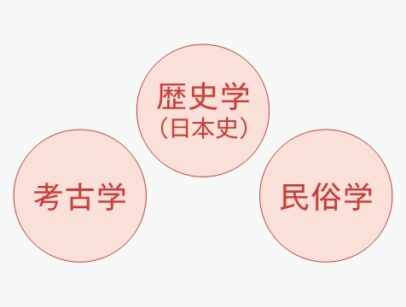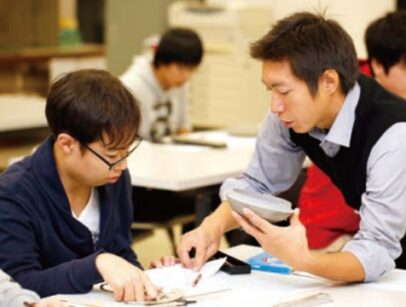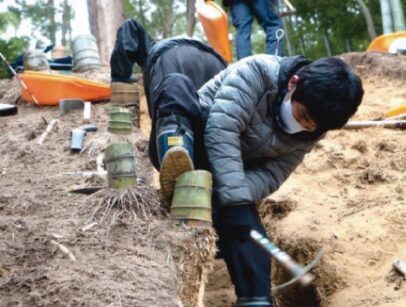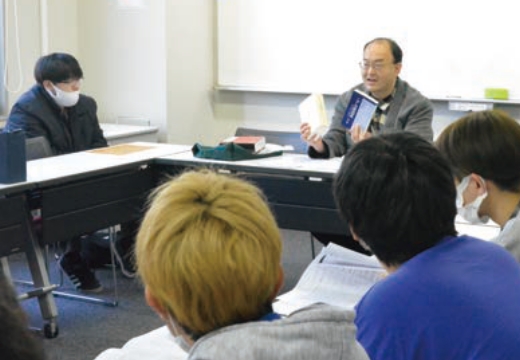Faculty of Humanities Department of History and Culture Learn history and gain a broad perspective on the world
English translation in progress. Thank you for waiting.
Contents
Department Overview
This Department is suitable for the following people:
- Those who like Japanese history, archaeology and folklore
- Those who want to become museum curators
- Those who want to make use of their favorite study in the future
Learning Key Points
01. Learn by coming in direct contact with authentic cultural assets
Through a variety of opportunities, students will deepen their knowledge of cultural properties through direct contact with historical materials in the fields of history (Japanese history), archaeology, and folklore, which are unique to Nara and Tenri. Students will also make use of the affiliated Tenri Central Library and the affiliated Tenri University Sankokan Museum to cultivate a wide range of knowledge and a high level of expertise.

02. Enrollment models focusing on the future
There is a growing demand for cultural assets in the general corporate world. In order for students to be able to make the most of their studies in history and culture, the Department offers seven enrollment models centered on teaching and museum curator certification.

03. Learning fields extending on and off Campus
The campus is located along the Yamanobe-no-Michi Trail, the oldest trail in Japan. The field of study extends both domestically and internationally, including excavation of the nearby Higashinorikura Kofun*, historical and folklore research in various parts of Japan, and excavation of archaeological sites in Israel.
* Kofun: ancient burial mound

Enrollment models and qualification models that make the most of what students leran for the future
Cultural Property Specialist (Museum Curator) Program
Students aim to become specialists in cultural properties by completing the museum curatorial program.
- Future vision: Museum Curator Education Committee Cultural Heritage Officer
"Teaching"qualification model (Social Studies at junior high school)
Students aim to obtain a First Class Junior High School Teaching License (Social Studies)
- Students aim to obtain a First Class Junior High School Teaching License (Social Studies)
"Teaching"qualification model (Geography and History at high school)
Students aim to obtain a First Class High School Teaching License (Geography and History)
- Students aim to obtain a First Class High School Teaching License (Geography and History)
"Government employee" enrollment model
Students aim to become national or local government employees and pass the civil service examinations.
- Future vision: National of local government employee
"General employment" enrollment model
Students aim to find employment in general companiews, such as caeer-track and sales positions.
- Future vision: General corporate employment (sales, office work, etc.)
"Graduate Schol Preparation" enrollment model
Students will aim to be admitted to the Master's Program of the Graduate School Pre-Doctoral Course.
- Future vision: Admittance to a graduate school
Cultural Resource Management Program
Students will aim to become working adults and public servants with an understanding of cultural assets.
- Future vision: Government employee (in charge of tourism department, etc.)
Four-year learning process
First-year
続きを読むAcquire basic knowledge of each discipline
Representative classes
 ・Introduction to Historiography
・Introduction to Historiography
Focusing on E. H. Carr's What is History? and introducing the history of historical studies since the modern era, we will consider what exactly it means to study history and what we aim to do.
Second-year
続きを読むLearn specialized knowledge and develop logical thinking skills
Representative classes
・History Studies Course: Introduction to Historiography
Students will learn the basics of the Humanities and Japanese history by developing an eye for finding prior research, summarizing the contents of articles and explaining them.・Archaeology Studies Course: Practicum in Archaeology 1, 2, 3
Students learn practical knowledge and skills required for archaeological site surveys, such as surveying archaeological sites using equipment and handling excavated artifacts.・Folklore Studies Course: Folk Culture and Fieldwork
Through the core elements of fieldwork, “walking, observing, and listening,” we will consider our daily lives, history, and culture from an ethnographic perspective.
Third-year
続きを読むExplore your own research topics
Representative classes
・History Studies Course: Practicum in Historical Documents 3, 4
Through the organization of unorganized historical materials at the affiliated Tenri Central Library, students will learn about the organization of documentary materials and lay the foundation necessary to become a person charge of cultural properties who can handle ancient documents.・Archaeology Studies Course: Documentation in Archaeology
Using materials excavated during excavations, students will learn theoretical and practical methods for efficiently organizing archaeological materials and making them informative according to the nature of the materials.・Folklore Studies Course: Seminar in Historical Folklore 1, 2
Students will consult with their teacher to select a paper on a traditional culture they would like to deepen, with the aim of gaining an understanding of current research and research methods.
Fouth-year
続きを読むWork on a graduation thesis as the culmination of your studies
【Examples of graduation thesis themes】
・History Studies Course
- (歴史学)又春廓川本楼で働く女性たちの実態について
(History Studies) The Day to Day Life of Women who Worked in the Red-light District of Yushunkaku-Kawamotoro - (歴史学)浅井氏の滅亡にみる家臣団の構造
(History Studies) The Vassalage System as Revealed by the Azai Family’s DownFall
・Archaeology Studies Course
- (考古学)近江・長原地域における飛雲文系軒丸瓦について
(Archaeology Studies) Eave-end Convex Roof Tiles with Flying Cloud Designs in the Omi and Nagahara Areas - (考古学)奄美大島における「弥生系土器」の基礎的研究
(Archaeology Studies) Fundamental Study of Pottery from the Yayoi Period in Amami Oshima
・Folklore Studies Course
- (民俗学)幟と旗飴 —奈良県における初午行事の変化と意味—
(Folklore Studies) Banners and Hataame (flag candy)—Changes and Meanings of the Hatsu-uma Day in Nara Prefecture— - (民俗学)人口減少地域における秋祭りの意義 —石川県七尾市中島町の笠師祭を事例に—
(Folklore Studies) The Significance of Autumn Festivals in a Declining Population Area: A Case Study of the Kasashi Festival in Nakajimamachi, Nanao City, Ishikawa Prefecture
- (歴史学)又春廓川本楼で働く女性たちの実態について
Employment Results and Qualifications
Employment Rate 90.2%
※Actual employment results for graduates of the Department of History and Culture Studies, Faculty of Letters in March 2023
Major employers (information for the most recent 5 years)
Nobels Co., Ltd., Kurokawa Industrial Arts Co., Ltd., Miyamae Co., Ltd., Cosmo Co., Ltd., Toyo Screen Kogyo Co., Ltd., Fukuchiyama City Gas Co., Ltd., Tokyo Computer Service Co., Ltd., Kyushu Railway Company, Kintetsu Railway Co., Ltd., Nagano Electric Railway, ACN Inc., Izumiya・Hankyu Oasis Co., Ltd., Daikokuten Bussan Company, Sato Co., Ltd., Uniqlo Co., Ltd., Yumerasen Co., Ltd., Yamauchi Co., Ltd., Asahi Co., Ltd., Toyota Corolla Co., Ltd., Nissan Prince Nara Co., Ltd., Komeri Co., Ltd., Alpine Co., Ltd., The Shinwa Bank Ltd., KitaiseUeno Shinkin Bank, ACT-One Yamaichi Co., Ltd., ORIX Auto Corporation, Sato Accounting Office, Toridoll Holdings Corporation, Tenri Hospital, Japan Post Holdings Co., Ltd., JA Naraken, Abe Monjuin Temple, Nara Prefecture, Gojo City, Hashimoto City, Hitoyoshi Kuma wide area administrative union, etc. (listed in no particular order)
Available Qualifications
- First Class Junior High School Teaching License (Social Studies)
- First Class High School Teaching License (Geography and History)
- Qualification for appointment as a social welfare administrator
- Librarian
- Museum curator
- Japanese language teacher
- Corrections and Rehabilitation
- Missionary of the Tenrikyo church
Faculty list
Curriculum
Curriculum tree(PDF)
Curriculum map(PDF)
Education policy
Admission Policy
In order to fulfill the educational goals of the Department of History and Culture Studies, we seek for students with the following qualities:
1. (Knowledge) Those who have an interest in acquiring basic knowledge about history and culture.
2. (Thought) Those who wish to acquire logical thinking skills.
3.(Knowledge, Skills) Those who desire to acquire expertise knowledge related to the studies of history, archaeology, and folklore.
4. (Skills, Action) Those who wish to acquire the ability to research, collect, analyze, and understand.
5. (Creativity, Action) Those who wish to acquire the ability to plan, express, and convey.
6. (Motivation, Action) Those who wish to acquire the ability to build identity and contribute to society.
7. (Motivation) Those who have had experience in actively engaging in social activities and extra-curricular activities, and have an interest in history.
Entrance examination methods will take various forms, such as comprehensive selection, special selection, school recommended selection, general selection, and transfer selection.Curriculum Policy
We systematically distribute subjects that allow students to acquire specialized knowledge related to the studies of history, archaeology, and folklore.
The classes are organized so that during the first year, students study a wide range of history and culture through basic seminars, introductory classes, and overviews. In the second year, students will choose to enroll either in the Historiography, Archaeology, or Folklore Course to deepen their understanding.
In the second year, students systematically learn specialized knowledge through Lecture subjects, acquire specialized skills through Reading subjects and Practicum subjects, and acquire the ability to collect and analyze materials and draw out research results. The curriculum is designed to enhance students' conceptual ability to plan their own research projects, logical thinking ability to analyze and discuss the results of their research, expressive ability to communicate their findings, and communication skills to discuss and deepen their ideas, which will ultimately lead to the writing of their graduation thesis. The curriculum is designed to help students improve their ability to plan their own research assignments, analyze the results of their research, think logically, express their findings, discuss and deepen their thinking, and write a graduation thesis.Diploma Policy
A bachelor's degree (History and Culture Studies) will be awarded to students who have acquired the following knowledge and abilities:
1. (Knowledge) Those who have acquired basic knowledge about history and culture.
2. (Thought) Those who have acquired logical thinking skills.
3. (Knowledge, skills) Those who have acquired expertise knowledge related to the studies of history, archaeology, and folklore.
4. (Skills, Action) Those who have acquired the ability to research, collect, analyze, and understand.
5. (Creativity, Action) Those who have acquired the ability to plan, express, and convey.
6. (Motivation, Action) Those who have acquired the ability to build identity and contribute to society.

 ・Introduction to Historiography
・Introduction to Historiography